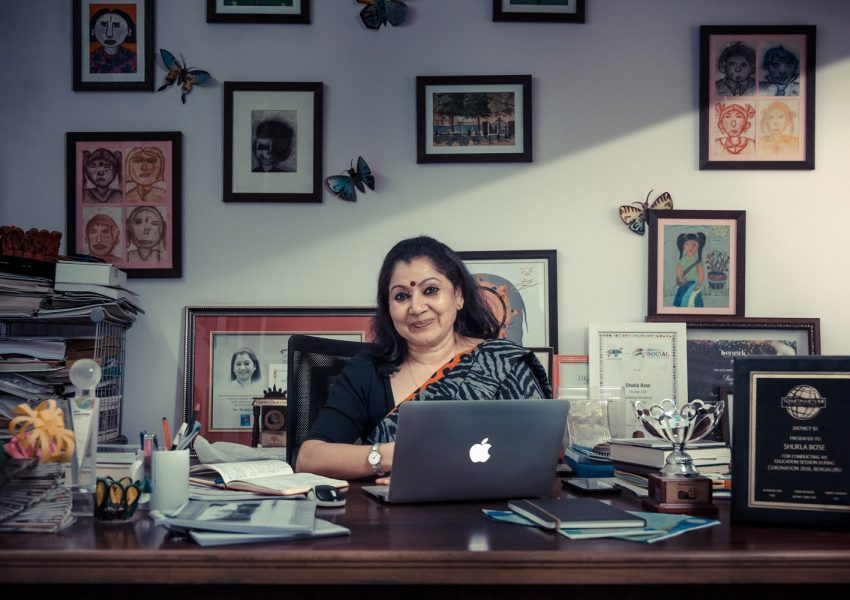
On leadership & more
Find the link to the published article here: https://www.eatmy.news/2021/06/shukla-bose-it-is-very-important-to.htm
Running an NGO is always dealing with the oppressed and the bottom of the pyramid that is riddled with deprivation, cynicism, and hopelessness. It is difficult to stay positive and keep inspiring the underprivileged to aspire for better things.
Tell us about your background, journey, and upbringing.
I come from a very modest background where I learned to value the importance of education not just for knowledge and information but for better preparedness for life and living.
Because I was sincere about my learning I did well in academics and earned scholarships into universities that I could not have otherwise afforded. I volunteered with Mother Teresa for seven years when I was a student and that has left a deep impact on me.
So although I was quite successful in a corporate career where I was a Global CEO for eleven years, I was always very conscious of the grassroots and knew that one day I would do something very different.
When and how did you get clarity on what you wanted to do?
After 26 years in corporate life where I had experienced the power of the material kind, I began to feel the need to do something more meaningful. I needed to feel the power to change lives and make life better.
So I quit the luxuries of corporate life and began Parikrma Humanity Foundation with all my life’s savings to run schools for street, slum, and orphaned children in 2003. We now have 4 schools and a college that provide free and quality education for 2000 children from marginalized families.
Although it was a huge change for me, I was not daunted because of the experience I had with Mother Teresa. I knew that if I was sincere and selfless I would definitely succeed. Mother Teresa would say that if we have patience, passion, and perseverance then nothing could come in the way.
Studies today show that an organization can lose INR 10 lakh (~ $17,000) on average on a wrong hire or for hiring someone with a false degree. The only tried and tested way to prevent frauds is via a thorough background verification process. Download SpringVerify’s e-book for a comprehensive guide to Employee Background Verification in India.
What does your typical workday look like?
I am an early riser and do most of my thinking and planning work early in the morning. I like cooking for my family and do spend a fair amount of time in the kitchen. I have five dogs at home and five other dogs in my schools and enjoy taking care of them.
Once I leave home for work it is a series of meetings that are both internal and external. I somehow find time to visit my schools and interact with my students. I love going into the classes of my kids and seeing how they are progressing. That is my favorite time.
I return home and do some reading and keeping up with what is happening around the world. It is a fairly packed day but I don’t feel tired because I enjoy every moment of my day.
Several global companies have come out and thrown their support behind not needing a formal education. What is your opinion about this?
I quite agree that it is not necessary to have a formal education and grading to be considered suitable for a job. When companies come forward to change these age-old parameters then it is indeed a good sign.
However, it does take time to change the mindset of employers and employees and we need to work out an interim plan that works. We should also work out an assessment of those that have not had a stereotypical formal education to find out how prepared they are to deal with conflict and collaborative work.
How do you handle someone who has lied on their resume?
It is unfortunate when a person has to lie to get a job. I would like to find out what drove that individual to resort to lies and whether they know what the consequences are. It is easy to fire a person to set an example. It is more difficult to reform that individual and yet set the standards of ethics and morality.
What are some of your typical challenges and how have they evolved over time?
Running an NGO is always dealing with the oppressed and the bottom of the pyramid that is riddled with deprivation, cynicism, and hopelessness. It is difficult to stay positive and keep inspiring the underprivileged to aspire for better things.
The most challenging aspect is to change the mindset of both the donors and the beneficiaries. And to serve large numbers with persistent financial constraints is a perennial challenge.
What advice do you have for aspiring entrepreneurs or those eyeing the top job?
My advice is simple. It is very important to have clarity, conviction, and commitment. To be a successful entrepreneur requires a great deal of hard work and a fair amount of courage. But it is important not to lose sight of the goal post and celebrate small successes along the way.
Which is your favorite book and why?
I like Abhijit Bannerjee’s “Poor Economics” because it gives accurate data of what actually happens in the world of the poor.
